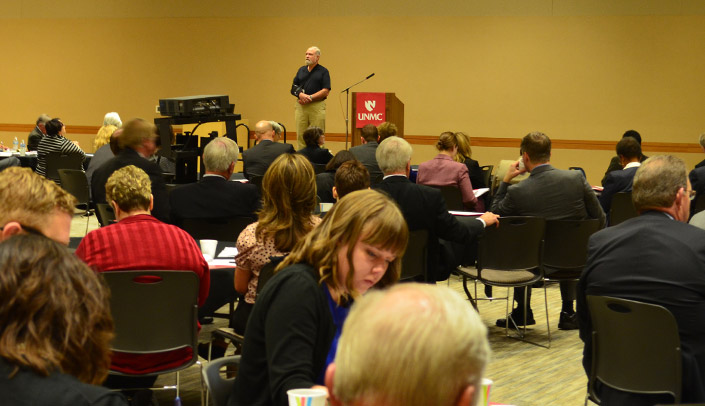Health care policymakers and stakeholders from across Nebraska recently assembled at UNMC for the second consecutive year, convening for a nearly day-long conference on the future of health care in the state.
A total of 175, including representatives from state and local government, public and private insurers, health care delivery organizations, health educators, employers, specialty societies, consumer groups and patients, gathered to build off of the ideas and concerns brought up at last year’s conference.
Attendees also heard from UNMC Chancellor Jeffrey P. Gold, M.D., keynote speaker Dan Crippen, Ph.D., executive director of the National Governors Association, and a handful of others, before breaking into smaller work groups.
“We are honored as a university to be included in this process,” said Dr. Gold. “To have our faculty and our leadership participate in this program is an important statement of what a great university does.
“This is a 500-mile campus,” he said. “It spans the entire state of Nebraska. And within the state of Nebraska, we have every single challenge and opportunity of health care that exists in the United States.”
Last year’s inaugural session was the result of LR 22, a legislative resolution co-sponsored by Sen. Kathy Campbell of Lincoln and Sen. Mike Gloor of Grand Island. The state senators this year co-sponsored another resolution, LR 422, to follow up on last year’s progress, and again, with the Health and Human Services Committee, took leadership positions on this year’s conference.
“It was an extremely gratifying day,” Gloor said. “Even though the larger group of stakeholders had not met for a year, they jumped back in as if (the previous conference) were last month. Their input, combined with the work of the smaller work group during the year, will give us a valuable planning document for future policy discussions and decisions.”
Campbell encouraged the stakeholders to continue to participate and use the information developed in LR 22 and LR 422 to advocate for health care transformation in Nebraska, saying, “Your voice will ultimately be the key to Nebraska’s health care future.”
Attendees addressed a number of issues, including: health care availability for all Nebraskans; effective models of health care delivery, financing and payment; transparency of quality and patient safety; statewide data and analysis of health and care delivery; population health-based interventions; personal responsibility for wellness; workforce shortages; statewide health planning.
